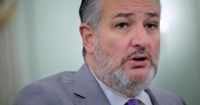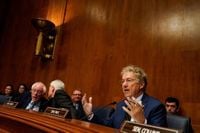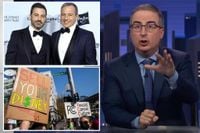In a week marked by heated debate over free speech and government oversight, a cascade of reactions has followed the Federal Communications Commission’s (FCC) intervention in the controversy surrounding late-night host Jimmy Kimmel’s remarks on the murder of right-wing activist Charlie Kirk. The incident has ignited fierce arguments across the political spectrum, spotlighting the delicate balance between regulatory authority, media independence, and First Amendment protections.
It all began after Kimmel, during his late-night show, lambasted what he called the “MAGA gang” for “desperately trying to characterize this kid who murdered Charlie Kirk as anything other than one of them and doing everything they can to score political points from it.” His comments, coming in the wake of Kirk’s assassination, quickly drew ire from conservative circles and set off a chain reaction within the media landscape.
FCC Chairman Brendan Carr entered the fray with a pointed warning. Speaking on a podcast hosted by right-wing commentator Benny Johnson, Carr declared, “We can do this the easy way or the hard way.” He suggested there was a “strong case” for the FCC to take action against ABC and its parent company, Disney, over Kimmel’s remarks. As reported by Fortune and confirmed by The Wall Street Journal, Carr’s comments were widely interpreted as a threat to the network’s broadcast licenses.
Within hours, the repercussions were felt across the industry. Nexstar Media Group, which owns 32 ABC affiliate stations and is in the midst of a $6.2 billion merger with Tegna—requiring FCC approval—announced it would pre-empt Kimmel’s show “for the foreseeable future.” Sinclair Broadcasting, the largest ABC affiliate group, also pulled the show and demanded Kimmel apologize to Kirk’s family. Disney-owned ABC followed suit, suspending Kimmel’s show indefinitely. The moves provoked backlash from viewers and media figures who accused the companies of capitulating to political pressure.
“Absolutely inappropriate,” said Sen. Rand Paul (R-Ky.) on NBC’s Meet the Press. “Brendan Carr has got no business weighing in on this. But people have to also realize that despicable comments, you have the right to say them. But you don’t have the right to employment.” Paul stressed that employment decisions should remain in the hands of businesses, not government agencies. “This is television, for goodness’ sakes. You have to sell sponsorships. You have to sell commercials. And if you’re losing money, you can be fired. But the government’s got no business in it. And the FCC was wrong to weigh in. And I’ll fight any attempt by the government to get involved with speech, I will fight.”
Paul’s stance was echoed by Sen. Ted Cruz (R-Texas), chair of the Senate Commerce Committee, which oversees the FCC. On his podcast, Cruz compared Carr’s remarks to “something a mafioso would say,” warning, “I think it is unbelievably dangerous for government to put itself in the position of saying, ‘We’re going to decide what speech we like and what we don’t, and we’re going to threaten to take you off air if we don’t like what you’re saying.’ And it might feel good right now to threaten Jimmy Kimmel, but when it is used to silence every conservative in America, we will regret it.”
Other Republican senators, including Todd Young of Indiana and Dave McCormick of Pennsylvania, also voiced support for Cruz’s concerns. “Important comments by my colleague on the Commerce Committee, Chairman Ted Cruz. As Americans, we must cherish and protect free speech,” Young posted on social media. McCormick added, “Good riddance to Jimmy Kimmel and his disgusting rhetoric. Ted also raises important concerns about the comments of the FCC chairman.”
Yet not all conservatives were united in opposition to Carr’s actions. Sen. Tom Cotton (R-Ark.) hailed Carr as “outstanding” and argued the media was “dishonestly blaming Carr for a business decision unrelated to Carr,” despite the visible sequence of events connecting Carr’s remarks to the show’s suspension. Rep. Chip Roy (R-Texas) told NBC that the FCC was right to question broadcast networks regarding their licenses, and Sen. Cynthia Lummis (R-Wyo.) suggested that broadcasting licenses are a privilege, not a right. “Under normal times, in normal circumstances, I tend to think that the First Amendment should always be sort of the ultimate right. And that there should be almost no checks and balances on it,” Lummis told Semafor. “I don’t feel that way anymore. I feel like something’s changed culturally. And I think that there needs to be some cognizance that things have changed.”
President Donald Trump, who has previously called for the FCC to reexamine licenses for broadcasters critical of him, praised Carr as an “American patriot” and a “fantastic patriot,” but disagreed with Cruz’s criticisms. “I think Brendan Carr doesn’t like to see the airwaves be used illegally and incorrectly … I disagree with Ted Cruz on that,” Trump told reporters. The president has also urged the FCC to consider canceling the licenses of other networks with outspoken late-night hosts.
From the other side of the aisle, Democrats were quick to denounce Carr’s actions. Senate Minority Leader Chuck Schumer (D-N.Y.) stated, “Donald Trump’s attack on free speech is despicable. It’s anti-American. It’s the road to dictatorship. If you lose freedom of speech, it’s the road to autocracy. Chairman Carr is one of the greatest threats to free speech in American history. He must resign immediately. And if not, Trump should fire him.”
The controversy also drew sharp criticism from within the entertainment industry. On HBO’s “Last Week Tonight,” John Oliver took aim at Disney CEO Bob Iger for suspending Kimmel and urged him to stand firm against government pressure. “History is also going to remember the cowards who definitely knew better but still let things happen, whether it was for money, convenience, or just comfort,” Oliver said. “Look, at some point you’re going to have to draw a line. So I’d argue, why not draw it right here?” Oliver accused Carr of pressuring broadcasters to censor speech, likening his tactics to those of organized crime figures, and lambasted Nexstar and Sinclair for swiftly removing Kimmel’s show.
Meanwhile, the public response was immediate and passionate. Demonstrators gathered outside the “Jimmy Kimmel Live!” studio in Hollywood, protesting what they saw as an attack on free speech and creative independence. The backlash highlighted the deep divisions in American society over the limits of acceptable speech, the role of government in media oversight, and the responsibilities of corporate leadership in the face of political pressure.
Adding another twist, court documents filed the day after Kimmel’s monologue revealed that the mother of Tyler Robinson—the accused killer of Charlie Kirk—told investigators her son had become “more political” and had started to “lean more to the left.” This detail complicated the narrative that Kimmel and his critics were sparring over, underscoring the dangers of rushing to politicize tragedy.
As the dust settles, the Kimmel controversy stands as a vivid example of the ongoing struggle to define the boundaries of free speech in an era of intense polarization, regulatory scrutiny, and corporate caution. With figures from all sides weighing in, the debate is far from over—and its outcome may shape the future of American media and democracy itself.



